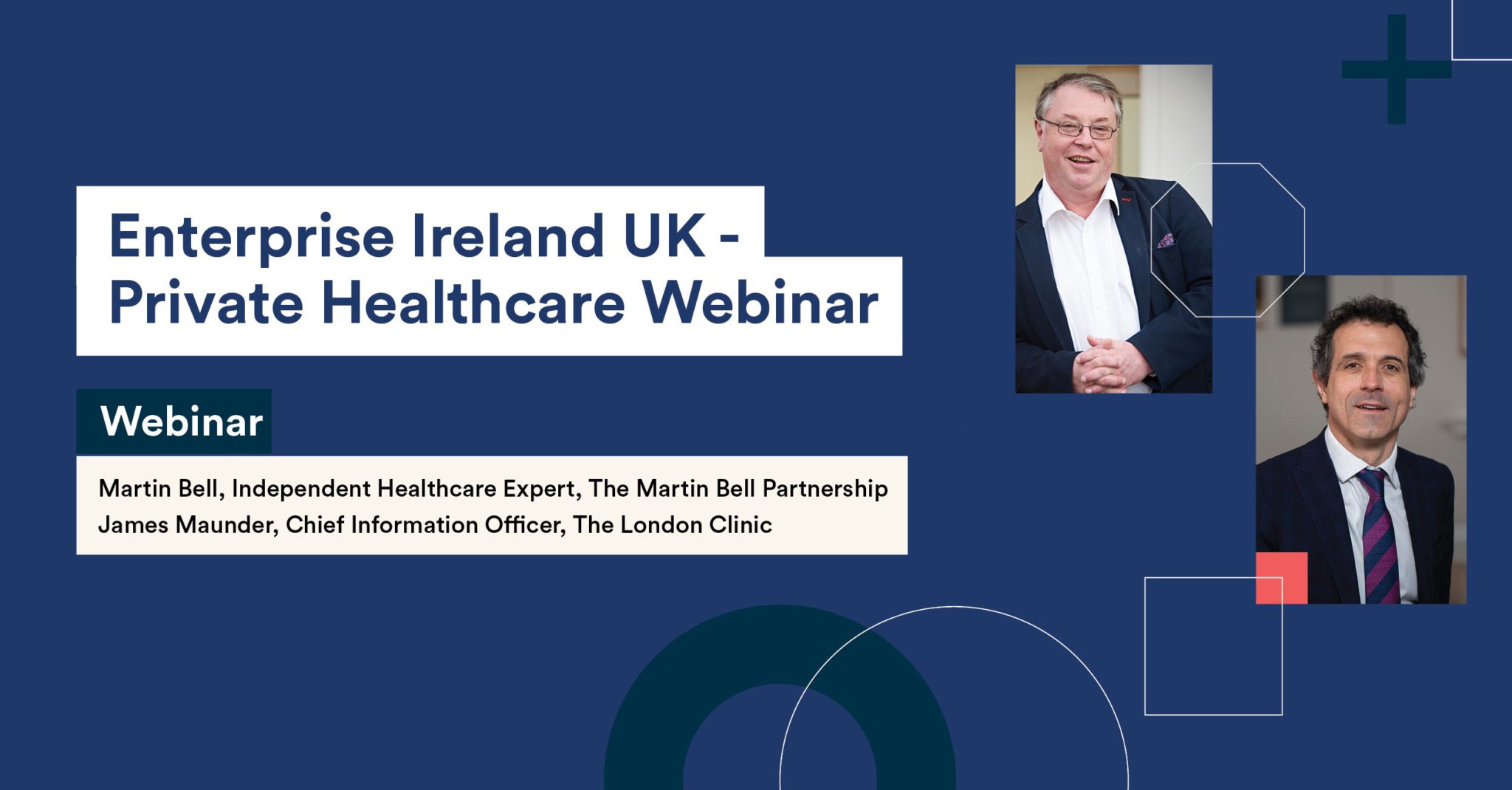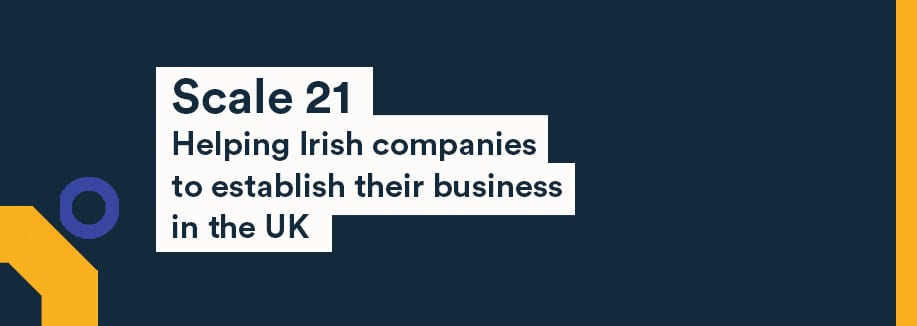Market Watch Industry Bulletin – Life Sciences
Download the bulletin here.
Download the bulletin here.

Download the bulletin here.

Key Takeaways:
“Restrictions on movement of people is impacting on clients’ ability to respond to customer and partner needs,” says Donohoe. “Market confidence and demand has been eroded, and deals are being lost while fund raising plans have been curtailed or stalled. There is great uncertainty on how deep the recession will be and how long it will last, and this makes for a particularly challenging time for Irish industry.
Donohoe says it’s vital for companies to stay connected by keeping abreast of what is going on, exploring the possibilities of virtual business and continuing to invest in client/partner relationships.
“It’s a time to listen and learn about the problems your clients are experiencing and how together you may find potential solutions which strengthen your partnership,” she says. “But also, it’s important to exercise caution when extending credit, especially when your business partners are relatively new, and you’re not familiar with their current liquidity position.
“So, I would encourage companies to actively research the marketing issues their clients are facing, seek out information on the current situation from trusted sources like the WHO or local government departments. And continue to invest in marketing because while industries globally are in crisis mode, they are still seeking solutions to trade so with heavy restrictions on travel, focus on virtual meetings and as a means of engaging prospective new customers.”
While it is undoubtedly a difficult time in business, the regional director says there have been many supports put in place across UK, Central & Northern Europe and Russia.
“A variety of measures have been adopted by the British and other European governments,” she says. “Each country is offering a range of specific supports including loans, wage subsidies or guarantees and these may be relevant for Irish companies with a presence overseas. OECD provides a regularly updated Country Policy Tracker to help navigate the global policy response and provides information on travel, border crossings and general health advice.
“Many sectors are severely impacted such as the tourism and hospitality trade, personal and professional services and certain areas of the financial and manufacturing sectors.
“Transport is also a major concern and although some countries (e.g. UK and Sweden) have not closed their borders, many others have created temporary regimes which are causing problems for road deliveries – logistics details can be found here.
With all these added complications, doing business can be difficult for Irish exporters and Enterprise Ireland is currently preparing sectoral market insights which will be shared with clients and updated weekly to provide view on market conditions, government supports etc. Details on public sector contracts and offers can be seen on this platform and also on the GOV.UK site.
Donohoe also says there are still opportunities for growth but in a few core sectors:
“As markets and sectors emerge from this crisis with expected fundamental shifts in consumer/business needs it is a time to also prepare for these changes. Ireland’s SMEs have demonstrated resilience and flexibility by adapting to Brexit challenges and a global recession so remaining agile will be an advantage”.
No-one knows when the crisis will be over, but Donohoe says it’s vital for Irish exporters to stay connected and prepare for the reopening of markets.
“Utilise all digital tools to deepen relationships and promote your business,” she advises. “Prepare for the upturn to secure existing business and research potential new opportunities to emerge now and post the crisis.
“Business and consumer demand will change so investment in research, new idea validation, competitor analysis and the development of strong market development plans will all position Enterprise Ireland clients for the next global economic growth cycle. Enterprise Ireland’s executives across the 8 offices in UK, Central & Northern Europe are on hand to support you through this exceptionally difficult and unprecedented period.”
All over Ireland people are singing happy birthday while they wash their hands. Then they sing it again. It’s because Irish healthcare technology company SureWash has provided people with a quick rule of thumb – and finger. If you want to make sure you wash your hands properly, spend as long doing it as it takes to sing the birthday song.
It’s a fun way to deliver a serious message, which perfectly reflects the healthcare technology company’s overall approach.
Throughout the emergency, leaders across the world have stressed that the primary tool we have at all our disposal in the fight against Covid-19 is the ability to wash our hands. Slowing down the virus’ spread depends on how often, and how well, we do it.
If hand hygiene is done properly it can be over 90% effective in preventing the spread of harmful germs, yet a large number of people are unaware that they are not washing their hands correctly.
SureWash is an augmented reality hand washing app developed in Ireland to provide proper hand hygiene training to healthcare workers, patients and visitors worldwide.
Developed by health professionals, the app ensures compliance in hand hygiene to World Health Organisation protocol. It delivers training in an engaging manner that encourages participation. It uses gamefication to generate enthusiasm and provides real-time feedback, to help users improve their technique.
The software system also provides infection control personnel with the data necessary to monitor hand hygiene progress and to guarantee positive results.
In response to the Covid-19 pandemic SureWash has launched its app to the general public, so that everyone can play their part in stemming community transmission.
According to the World Health Organization (WHO), everyone should regularly and thoroughly clean their hands with soap and water, or if that is not available, an alcohol-based hand rub, in order to kill viruses that may be on your hands and protect against infection.
In consideration of the number of shared surfaces that we touch on a daily basis, our hands although not visibly dirty, can still be contaminated.
A large number of people are unaware that they are not washing their hands correctly however, missing key surfaces such as thumbs and finger tips.
Cleaning your hands is vital, not least because not touching your face, the other main piece of advice we receive in relation to Covid-19, is hard to do. Studies show the average human touches their face around 23 times per hour.
The chance of infection substantially increases if we are touching our faces with contaminated hands.
SureWash’s 6-step technique helps users to develop a life-long skill. The consumer version of the SureWash Hand Hygiene APP is available to download on both the Apple and is a replica of the SureWash kiosks that are already in use in hundreds of hospitals around the world. Altogether now…..
The company’s new recombinant SARS-CoV-2 nucleocapsid protein (code CK 6404) will, it hopes, be of critical importance in stemming the current pandemic.
SARS-CoV-2, or COVID-19 as it is also known, was declared a Public Health Emergency by the World Health Organisation (WHO), due to the unprecedented international spread of the disease. All coronaviruses are enveloped positive-sense RNA viruses that affect many species and have the potential to cause pandemic disease outbreaks.
All viruses have Nucleocapsid (N), Spike (S), Envelope (E) and Membrane (M) structural proteins and some also encode a hemagglutinin–esterase (HE) protein.
The nucleocapsid protein plays a fundamental role during virion assembly – a late stage part of the viral life cycle – through its interactions with the viral genome and membrane protein M. It also has an essential role in enhancing the efficiency of subgenomic viral RNA transcription, as well as viral replication.
“Patients are currently being screened for the virus by PCR (polymerase chain reaction)”, explained Philip Noone, CEO of Aalto Bio Reagents, “however there is an important need for serological tests as well to detect all those mild or even asymptomatic cases that may otherwise be missed.”
The prevalence of these asymptomatic cases can lead to a rise in community transmission of a disease, simply because, without symptoms, carriers don’t realise they have it. “Sero-epidemiologic investigations, such as those aimed to better understand transmission characteristics and severity of COVID-19, are also essential,” he said.
“The medical field and diagnostic industry has an unrelenting requirement for access to the most scientifically proven raw materials in outbreak situations like this, where fast diagnosis is required. With our new SARS-CoV-2 nucleocapsid protein we endeavour to meet this urgent demand”.
The company has a long track record in helping to fight infectious disease, having been founded in 1978 to supply raw materials to the global diagnostics industry.
Today it produces more than 300 different reagents which are used to diagnose a huge range of diseases around the world, including serious tropical viruses such as dengue, yellow fever and zika virus.
As such the award winning innovator is firmly established as a leading manufacturer and provider of raw materials to the in-vitro diagnostics industry and research laboratories globally.
It supplies the largest multinational companies in the industry with a broad range of purified human proteins, monoclonal and polyclonal antibodies, fungal, parasitic, bacterial and viral antigens as well as disease state plasma for in-vitro diagnostic applications.
“We have two main types of customers, the high-tech diagnostic company and the companies who are creating vaccines to treat emerging diseases,” Noone told Enterprise Ireland. “With any of these diseases, there is a race to find a vaccine.”
While remote working had become common in certain sectors, especially those in which skilled talent is in high demand, it’s new for many companies. They need to quickly implement new technology to ensure their employees can adapt and continue to be productive while working from home.
Talent tech is enabling home-based employees to engage with colleagues, maintain their wellbeing while in a new routine, and upskill at home through online courses.
Meanwhile, employers can use Irish-built tech stay in operation, keep their workforce engaged, and manage, schedule, and pay their employees while the latter work remotely.
While some industries will see temporary workforce reductions, those such as health, retail and other frontline industries will need to hire more people fast. Talent tech can provide them with remote technology for sourcing and interviewing potential employees.
These nine Irish companies offer disruptive technologies businesses can use to manage how employees work as they navigate these turbulent times.
With healthcare systems under huge pressure due to coronavirus, optimising care capacity is crucial. Wellola has collaborated with the Irish public health services provider, the Health Service Executive (HSE), to launch a new online portal that enables GP and healthcare providers to treat people remotely so as to protect themselves from Covid-19.
As the world turns to remote working, Abodoo is there to connect global citizens with remote jobs. With 23,000 members across more than 60 countries, Abodoo’s SaaS platform uses smart matching technology powered by data analytics to match people to roles. This means companies can build highly scalable distributed teams quickly and cost-effectively.
With in-person interviews on hold for now, recruiters must turn to virtual solutions. Sonru is an award-winning global leader in asynchronous video interviewing, which gives both candidates and interviewers flexibility. Importantly, it also removes pain points such as interview scheduling, time zone restrictions, dispersed hiring teams, and time lost on no shows.
To thrive and survive, companies need to promote a high performance culture. PepTalk is a workplace wellbeing platform that drives team engagement, productivity and connection across organisations in a fun way. Peptalk’s ‘whole person performance’ approach unlocks employee potential, helps companies to reimagine their work cultures and delivers bottom-line results.
During times of crisis, internal communications are critical for engaging and reassuring employees. With the Workvivo internal comms platform, employees can read and post content to an activity feed, and like, share and comment as they would on non-work social media. They can also recognise others through shoutouts, link posts to company goals and values, create community spaces, and publish articles and events.
Especially now, employers need to be able to manage flexible working arrangements and the changing needs of their employees. FlexTime offers flexible working, time and attendance, and scheduling solutions. Its products, which eliminate the need for manual tracking, are used by over 400 customers, in more than 5,000 implementations for over 200,000 users.
Now more than ever, it’s vital to protect employee mental health and wellbeing, and promote self-care. PulseLearning, an award-winning, global top 10 learning company founded in 1999, developed the I Am Here programme to facilitate a cultural change within organisations so team members know it’s absolutely OK to ask for help and how they can.
Managing finances can be challenging at the best of times. Flexiwage, which integrates with existing payroll packages, empowers employees and employers to make smarter financial decisions. Employees gain a fully flexible pay schedule, getting paid when it’s best for them, while employers can consolidate payroll, reduce costs and promote financial responsibility.
It’s still vital for employees to learn and train while they work remotely. LearnUpon is a powerful learning management system (LMS) platform with a practical approach. Organisations can use it to manage, track, and achieve their learning goals. Trusted by over 1,000 customers worldwide, LearnUpon is one of the fastest growing LMSs in the world.
Half of the existing ventilators in acute hospitals around the world were made in Ireland, which is ranked as one of the top five global medtech hubs.
Medtronic, the world’s largest standalone medical device maker, produces ventilators in a large manufacturing plant in Galway, in the west of Ireland. It is doubling its capacity by more than doubling its workforce of 250 and moving to round-the-clock production.
Another firm increasing production to meet high global demand related to coronavirus treatment is Enterprise Ireland-backed client Aerogen. It’s the world’s leading supplier of aerosol drug delivery products through ventilators to patients in critical and intensive care.
Before the current crisis, Aerogen already provided hospitals in more than 75 countries with its products, benefitting 10 million patients.
Aerogen CEO John Power expects the company could ship 3m or 4m units in 2020, up from 2m in 2019. It is also investigating how to address the global ventilator shortage by adapting non-invasive ventilation systems and are striving to ensure they can meet the sudden and unprecedented growth in demand.
Galway-based M&M Qualtech manufactures products for the medtech, aviation, ICT and other sectors. It produces ventilators, nebulisers and medical monitoring equipment for its medtech customers, including Aerogen and Medtronic. It says it’s seeing capacity demand three to five times higher than the usual pre-crisis level.
M&M Qualtech began to see this spike in manufacturing demand in early March and already expects to produce 4m nebulisers this year, up from 2m last year. It also anticipates a similar rate of increase in production of nebuliser controllers (likely to produce 45,000, up from 35,000) and ventilator AC modules (expecting to make 18,000, up from 5,000 in 2019).
It’s increasing capacity by focusing factory production on the most critically needed medical products, hiring up to 25% more Production Operators, engaging with suppliers daily to expedite materials into production, and redesigning its factory to meet social distancing requirements.
Also based in the west of Ireland, Vitalograph is the world leader in the analysis of cough drug trials. It specialises in cardiorespiratory and related devices that measure lung and cardiac function, diagnose lung disorders and also produces associated products and software.
Vitalograph is working to meet increased demand for spirometers and consumables such as bacterial-viral filters and test kits and seeing a significant increase in orders of remote monitors. Over the past 15 years, Vitalograph remote monitoring has mainly been used in clinical trials but is now rapidly being adopted by mainstream healthcare.
According CEO, Frank Keane, “Remote monitoring enables the most vulnerable patients with conditions such as COPD, cystic fibrosis and IPF to remain in their homes and not travel to hospitals or clinics and risk picking up infections,”
Vitalograph has also recruited more staff, and increased both capacity and orders from sub-suppliers, and activated their comprehensive business continuity plan.
Deirdre Glenn, Head of Lifesciences with Enterprise Ireland, said “In the face of the Covid-19 pandemic, Irish medtech companies are rising to the challenge of meeting the increased global demand for essential equipment needed for the treatment and prevention of Covid-19. As the second largest exporter of medtech products in Europe, and with the highest number of people per capital employed in medtech in Europe, Ireland is primed to play its role in the global fight against Covid-19”

 The UK has always been and remains Irelands largest single trading partner with a wealth of opportunities for Irish companies.
The UK has always been and remains Irelands largest single trading partner with a wealth of opportunities for Irish companies.Gillian Doyle, CEO Cerebreon discusses her experience of participating on Scale UK and gives her advice for companies applying for next year’s programme.
Carol Ward, President at Man GLG and Scale UK mentor shares her experience of Scale UK, working with fellow mentors and Irish diaspora and the importance of supporting companies with growth ambition for the UK.
Dublin based HiberGene Diagnostics develops and manufactures molecular diagnostics tests for human infectious diseases. It specialises in the manufacture of rapid and highly accurate testing solutions that are cost effective and simple to use.
Now it is developing a new and rapid test for the novel coronavirus, which it hopes to bring to market shortly after clinical evaluation at potential sites in China, Italy & Ireland.
HiberGene’s tests are based on non-invasive human samples such as swabs, and minimal sample processing.
Because the test for the new coronavirus is a “near patient test”, samples will be taken and tested on location, without needing to be sent offsite to a laboratory, it expects to diagnose a positive COVID 19 result in approx. 20 minutes, many times faster than the fastest existing molecular diagnostic tests.
Fellow Irish biotech company Aalto Bio Reagents has launched a new protein with the power to fight the Covid-19 on three fronts – diagnosis, vaccines and research.
Its new recombinant SARS-CoV-2 nucleocapsid protein (code CK 6404) is available for diagnostic test manufacturers, vaccine developers and researchers globally, all of whom are working to stem the current pandemic.
“Patients are currently being screened for the virus by PCR”, explained Philip Noone, CEO of Aalto Bio Reagents, “however there is an important need for serological tests as well to detect all those mild or even asymptomatic cases that may otherwise be missed. Sero-epidemiologic investigations, such as those aimed to better understand transmission characteristics and severity of COVID-19, are also essential.”
The medical field and diagnostic industry have an unrelenting requirement for access to scientifically proven raw materials in outbreak situations like this, where fast diagnosis is required, he said. “With our new SARS-CoV-2 nucleocapsid protein we endeavour to meet this urgent demand.”
Irish company Aerogen has pioneered new ways to help people in respiratory distress. To date more than nine million patients worldwide have benefited from its innovative aerosol drug delivery technology.
Unlike conventional nebulisers, Aerogen has an in-line circuit design, which means the ventilation circuit does not need to be broken for drug delivery. Its management team believes it could therefore be a viable option to help deliver industry-leading care to patients infected with Covid-19.
Its products offer a lower risk of transmission of patient generated infectious aerosol for health care professionals in acute care settings than traditional nebulisers.
For patients requiring ventilation, its vibrating mesh technology, and closed circuit design, makes it a viable option to help deliver industry-leading care. Recent UK government guidelines state that when treating respiratory patients a closed suctioning system must be used, and that ventilator circuits should not be broken unless necessary.
Unlike conventional nebulisers, the Aerogen Solo device has an in-line circuit design and is designed so that the medication reservoir is isolated from the breathing circuit, minimising nebulisation of contaminated fluids.
Pioneering plasma technology developed by Irish company Novaerus is already being deployed to purify air for patients and medical staff.
Novaerus helps control the spread of pathogens by closing the infection control loop made up of hands, surfaces, and now air. It uses a patented technology that kills airborne viruses by sucking air from a room and passing it through patented plasma coils which destroy them, reducing the risk of cross-infection.
Several of its medical-grade, clean air solutions have been donated to hospitals in Wuhan, China.
These include its latest model, Defend 1050, a mobile solution designed for rapid remediation in large spaces and situations with a high risk of infection.
Coronaviruses spread via respiratory droplets produced when an infected person coughs or sneezes, similar to how influenza and other respiratory pathogens spread. “The most difficult disease transmission-route to guard against is airborne because we have very little to protect us when we breathe,” explained Dr Kevin Devlin, CEO at WellAir, the Irish parent company of Novaerus.
Leaders across the world have stressed that the primary tool we have at all our disposal in the fight against Covid-19 is the ability to wash our hands. Stemming the virus’ spread depends on how often, and how well, we do that.
If hand hygiene is done properly it can be over 90% effective in preventing the spread of harmful germs, yet a large number of people are unaware that they are not washing their hands correctly.
SureWash is an augmented reality hand washing app developed to provide proper hand hygiene training to healthcare workers, patients and visitors worldwide.
It ensures compliance in hand hygiene to World Health Organisation protocol by delivering training in an engaging manner that encourages participation. By providing real-time feedback, it helps users to improve their technique.
The software system also provides infection control personnel with the data necessary to monitor hand hygiene progress and to guarantee positive results.
In response to the Covid-19 pandemic it has launched its app to the general public, so that everyone can play their part.
Patient portal developer Wellola responded to a call from Ireland’s Health Services Executive (HSE), Ireland’s national health authority, to develop and launch a new secure communication portal for clinicians and primary care providers in response to the pandemic.
Called HSE Covid 19 Portal, it’s an easy to use digital tool designed to optimise doctor and patient safety. Patients access it via an app which is downloadable via the HSE Covid 19 website. The new online portal allows GPs and healthcare providers to treat people remotely so as to protect themselves from Covid-19. The portal allows GPs and primary-care providers to easily offer patients a range of services, including online bookings, a video consultation service, secure messaging and form completion to assist in triaging.
The Covid 19 app is based on existing technology already developed and tested by Wellola and so was ready to launch just four days after receiving the call from the HSE.
Finally, in the face of a worldwide shortage of life saving ventilators, an international initiative called the Open Ventilator Project quickly came together on Facebook to design and build a 3-D printed ventilator.
In Ireland the project was led by Colin Keogh of Sapien Innovation, a specialist in applied innovation, creativity and design thinking services. Within a week it had produced a prototype it hopes will be validated by Ireland’s health authorities for use in the fight against Covid-19.

If you are considering doing business in China, please be sure to explore our tips to enter the market below and also be sure to reach out to our dedicated team.
If you are considering doing business in China be sure to reach out to our team and read our Going Global Guide for more information.